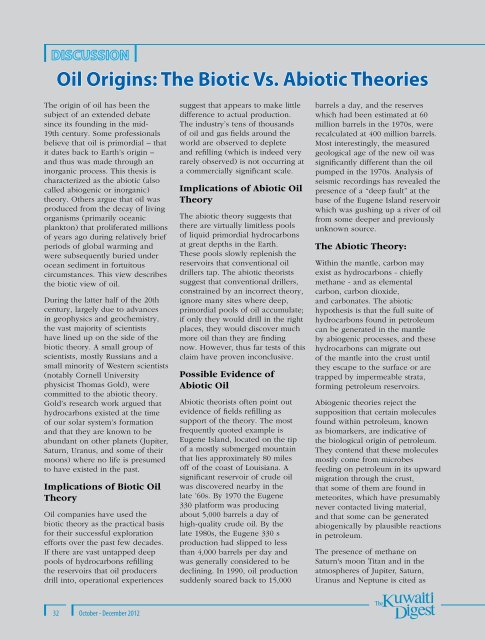4 - Kuwait Oil Company
4 - Kuwait Oil Company
4 - Kuwait Oil Company
You also want an ePaper? Increase the reach of your titles
YUMPU automatically turns print PDFs into web optimized ePapers that Google loves.
<strong>Oil</strong> Origins: The Biotic Vs. Abiotic TheoriesThe origin of oil has been thesubject of an extended debatesince its founding in the mid-19th century. Some professionalsbelieve that oil is primordial – thatit dates back to Earth’s origin –and thus was made through aninorganic process. This thesis ischaracterized as the abiotic (alsocalled abiogenic or inorganic)theory. Others argue that oil wasproduced from the decay of livingorganisms (primarily oceanicplankton) that proliferated millionsof years ago during relatively briefperiods of global warming andwere subsequently buried underocean sediment in fortuitouscircumstances. This view describesthe biotic view of oil.During the latter half of the 20thcentury, largely due to advancesin geophysics and geochemistry,the vast majority of scientistshave lined up on the side of thebiotic theory. A small group ofscientists, mostly Russians and asmall minority of Western scientists(notably Cornell Universityphysicist Thomas Gold), werecommitted to the abiotic theory.Gold’s research work argued thathydrocarbons existed at the timeof our solar system’s formationand that they are known to beabundant on other planets (Jupiter,Saturn, Uranus, and some of theirmoons) where no life is presumedto have existed in the past.Implications of Biotic <strong>Oil</strong>Theory<strong>Oil</strong> companies have used thebiotic theory as the practical basisfor their successful explorationefforts over the past few decades.If there are vast untapped deeppools of hydrocarbons refillingthe reservoirs that oil producersdrill into, operational experiencessuggest that appears to make littledifference to actual production.The industry’s tens of thousandsof oil and gas fields around theworld are observed to depleteand refilling (which is indeed veryrarely observed) is not occurring ata commercially significant scale.Implications of Abiotic <strong>Oil</strong>TheoryThe abiotic theory suggests thatthere are virtually limitless poolsof liquid primordial hydrocarbonsat great depths in the Earth.These pools slowly replenish thereservoirs that conventional oildrillers tap. The abiotic theoristssuggest that conventional drillers,constrained by an incorrect theory,ignore many sites where deep,primordial pools of oil accumulate;if only they would drill in the rightplaces, they would discover muchmore oil than they are findingnow. However, thus far tests of thisclaim have proven inconclusive.Possible Evidence ofAbiotic <strong>Oil</strong>Abiotic theorists often point outevidence of fields refilling assupport of the theory. The mostfrequently quoted example isEugene Island, located on the tipof a mostly submerged mountainthat lies approximately 80 milesoff of the coast of Louisiana. Asignificant reservoir of crude oilwas discovered nearby in thelate ’60s. By 1970 the Eugene330 platform was producingabout 5,000 barrels a day ofhigh-quality crude oil. By thelate 1980s, the Eugene 330′sproduction had slipped to lessthan 4,000 barrels per day andwas generally considered to bedeclining. In 1990, oil productionsuddenly soared back to 15,000barrels a day, and the reserveswhich had been estimated at 60million barrels in the 1970s, wererecalculated at 400 million barrels.Most interestingly, the measuredgeological age of the new oil wassignificantly different than the oilpumped in the 1970s. Analysis ofseismic recordings has revealed thepresence of a “deep fault” at thebase of the Eugene Island reservoirwhich was gushing up a river of oilfrom some deeper and previouslyunknown source.The Abiotic Theory:Within the mantle, carbon mayexist as hydrocarbons - chieflymethane - and as elementalcarbon, carbon dioxide,and carbonates. The abiotichypothesis is that the full suite ofhydrocarbons found in petroleumcan be generated in the mantleby abiogenic processes, and thesehydrocarbons can migrate outof the mantle into the crust untilthey escape to the surface or aretrapped by impermeable strata,forming petroleum reservoirs.Abiogenic theories reject thesupposition that certain moleculesfound within petroleum, knownas biomarkers, are indicative ofthe biological origin of petroleum.They contend that these moleculesmostly come from microbesfeeding on petroleum in its upwardmigration through the crust,that some of them are found inmeteorites, which have presumablynever contacted living material,and that some can be generatedabiogenically by plausible reactionsin petroleum.The presence of methane onSaturn's moon Titan and in theatmospheres of Jupiter, Saturn,Uranus and Neptune is cited as32October - December 2012
















